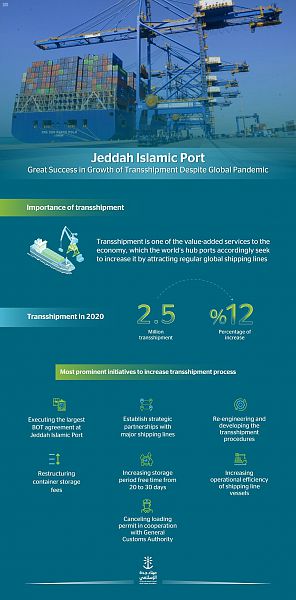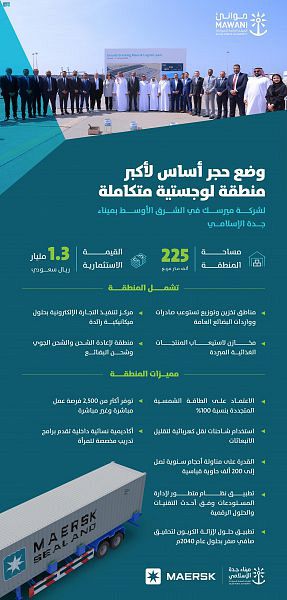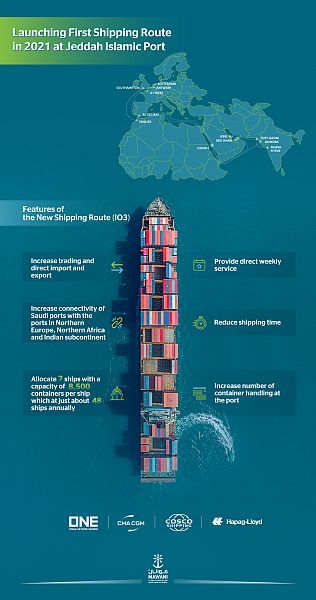
JEDDAH – The Jeddah Islamic Port has achieved a remarkable increase in the number of transshipment containers by 2.5 million standard containers during the year 2020, an increase of 12 percent compared to the same period of 2019, amid an integrated system of competitive services.
This continuous increase in transshipment activity, which is an added value to the economy, comes from the value-added services that the world’s hub ports seek to increase by attracting regular international shipping lines to them, in line with the Kingdom’s ambition to transform into a global logistics center, confirming the efficiency of logistical and operational performance and the efficiency of supply chains at the Jeddah Islamic Port.
The Jeddah port is distinguished by its strategic location on the Red Sea coast, through which more than 13 percent of the volume of international maritime trade passes, and hence it is called as a link between the world’s three continents of Asia, Europe and Africa. It is also considered as the first and foremost port handling maritime transit trade of transshipment containers, thanks to the integration of its infrastructure and advanced handling equipment, as well as the ease in procedures in the field of clearing containers and goods in a record period of time, in addition to the speed of loading and unloading operations.
The Jeddah Islamic Port handles more than 70 percent of the goods exported and imported through the Saudi ports, while it ranks first among the Red Sea ports. It is located on the commercial maritime artery that connects the Far East, Europe and the Horn of Africa through 62 wharves equipped with the latest equipment and technologies in accordance with international specifications, with a capacity of 130 million tons.
In light of the importance of transshipment operations around the world, the Saudi Ports Authority (MAWANI) has made qualitative moves to raise the competitiveness of these operations at Jeddah Islamic Port by re-engineering and developing transshipment procedures, canceling the loading permit in cooperation with the General Customs Authority, apart from restructuring storage fees to stimulate shipping lines, in addition to increasing the period of storage free time from 20 days to 30 days.
The authority has also worked on operational handling for transshipment containers in accordance with international practices, increasing the operational efficiency of shipping lines, as well as using the latest technologies with international specifications for remote operation with automated technology. This is in a way that contributes to raising handling rates and providing the highest levels of logistics services, as well as making changes in wages for large and competitive storage periods, establishing strategic partnerships with major international shipping lines, and stimulating feeder and coastal services to increase transshipment quantities.
In this context, MAWANI strives to have the Kingdom’s ports, on top of which the Jeddah Islamic Port, a pioneering role in regional level as well as in the global competition by gaining major chunk of transit maritime trade in the Red Sea, as well as to attract an additional share of competition operations around the world to Saudi ports. The authority also seeks to conclude more strategic partnerships with major international shipping lines, establish logistical areas attractive to investment in the ports sector and achieve an added value in the national economy.
It is noteworthy that the Kingdom’s ports currently acquire approximately 20 percent of the transshipment market in the region, as well as 80 percent of the total transshipment market in the Red Sea. They also target to acquire more than 50 percent of the transshipment market by the end of 2030. This is through activating logistical services to attract more transshipment vessels, in a way that contributes to consolidating the Kingdom’s strategic position as a global logistics hub that connects the three continents, keeping pace with the pillars of the National Industrial Development and Logistics Program (Nadlib) in accordance with the Kingdom’s Vision 2030.












